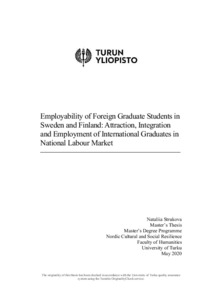Employability of Foreign Graduate Students in Sweden and Finland: Attraction, Integration and Employment of International Graduates in National Labour Market
Strukova, Nataliia (2020-06-16)
Employability of Foreign Graduate Students in Sweden and Finland: Attraction, Integration and Employment of International Graduates in National Labour Market
Strukova, Nataliia
(16.06.2020)
Julkaisu on tekijänoikeussäännösten alainen. Teosta voi lukea ja tulostaa henkilökohtaista käyttöä varten. Käyttö kaupallisiin tarkoituksiin on kielletty.
avoin
Julkaisun pysyvä osoite on:
https://urn.fi/URN:NBN:fi-fe2020090969080
https://urn.fi/URN:NBN:fi-fe2020090969080
Tiivistelmä
The thesis focuses on the phenomenon of employability among foreign graduate students in Finland and Sweden and how it is supported by the national higher education and migration policies. To do that, the thesis aims to analyse how both countries attract foreign students to higher education institutions, what conditions they create for their successful integration to the local society and labour market and, finally, how well the foreign degree students get employed after graduation. In the theoretical part, the paper investigates the countries’ policies and how they support or challenge the foreign students’ employability. The empirical part represents the data collected through questionnaire.
As the result of the performed analysis, it is clear that both countries undergo similar processes in terms of internationalisation of higher education and, therefore, encounter comparable difficulties on the way of integration of the foreign students to the national market. However, student immigration regulations and higher education policies tend to be slightly more inclusive in Finland than in Sweden. The thesis also revealed that nearly all respondents considered an opportunity to sustain employment in the country, and despite a number of mentioned difficulties, the majority of the respondents managed to find employment within a short period of time. The reported satisfaction with employment is also quite high in both countries.
Overall, this thesis demonstrated a high capacity of both countries towards accepting and integrating international students what serves a good example of an inclusive labour environment - an integral part of the modern welfare states.
As the result of the performed analysis, it is clear that both countries undergo similar processes in terms of internationalisation of higher education and, therefore, encounter comparable difficulties on the way of integration of the foreign students to the national market. However, student immigration regulations and higher education policies tend to be slightly more inclusive in Finland than in Sweden. The thesis also revealed that nearly all respondents considered an opportunity to sustain employment in the country, and despite a number of mentioned difficulties, the majority of the respondents managed to find employment within a short period of time. The reported satisfaction with employment is also quite high in both countries.
Overall, this thesis demonstrated a high capacity of both countries towards accepting and integrating international students what serves a good example of an inclusive labour environment - an integral part of the modern welfare states.
